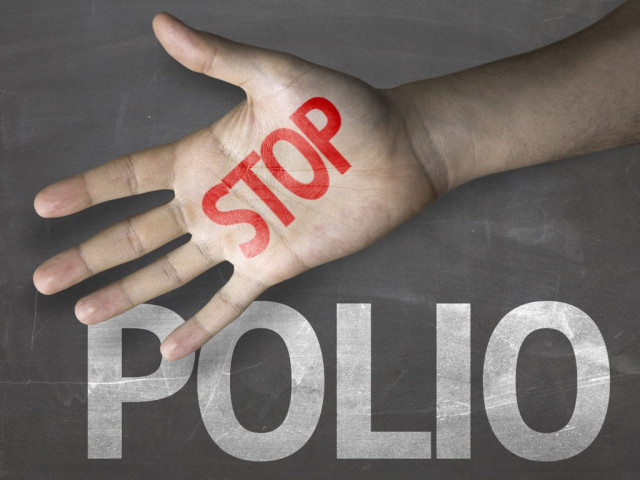Unprecedented number of cases surface in first quarter
There have not been as many cases reported in this period since the year 2000.

If the virus is in the environment, even if no one has it, someone can get polio, says the EPI K-P director. PHOTO: FILE
Abdul Wali celebrated his first birthday sometime this February. He lives in Data Khel, in a village called Kamar Kala in Miranshah, North Waziristan Agency (NWA). No one knows if Wali had already taken his first steps or if he will ever be able to walk straight as the 14-month-old has been diagnosed with polio.
Confirmed by the Prime Minister’s (PM) Polio Monitoring Cell on Friday, Wali’s case takes the country’s total to 59 – one more than the total number of polio diagnoses reported in all of 2012. This brings Pakistan to another dark milestone. There have not been as many cases of polio in the first four months of a year since 2000.
PM Focal Person on Polio Eradication Ayesha Raza Farooq confirms, “We have never seen so many cases in the first quarter – it is unprecedented.”
More than 90% of these originate from the tribal areas, and, she tells The Express Tribune, the reason is very obvious, “We have not been able to vaccinate in our tribal areas – North and South Waziristan and Khyber Agency.”
What went wrong
“These numbers are not the result of the last two or four or eight months but the result of a lack of vaccination for two years.”
Farooq explains the concentration of cases lies in “areas which are highly compromised security wise or where there is active militancy.” Citing Khyber-Pakhtunkhwa (K-P) and Karachi, she said the attacks on polio teams at the end of 2012 and the beginning of 2013 made it particularly difficult to carry out immunisation activities.
Farooq said 2013 was a particularly bad year. “The interim government dismantled polio bodies so we lost two to three months but now we are doing a few things differently,” she said while answering a question about strategies to stem the spread.
Possible, plausible solutions?
“We are working to secure and strengthen transit points all over the country where vaccinations will take place. Already 3.4 million children have been vaccinated at these points,” said Farooq.
Inter-provincial meetings were held between bordering districts where migratory and travel patterns were discussed, she said, adding it was then decided where to place the transit vaccination points and how often to vaccinate.
A similar conference was held with Afghanistan to discuss how to prevent the poliovirus from being transmitted across the border, shares Farooq.
But the biggest ‘if’ remains North and South Waziristan.
Farooq claims some headway is being made to create access to the children there.
“We are talking to the army and paramilitary forces there. Recently, we started negotiating with civil-military coordination committees, which have been in place in the Federally Administered Tribal Areas (Fata) since 2011.”
“The civil administration and army will provide security to our teams so people going in and out of Fata are vaccinated,” Farooq said. “Our teams will vaccinate wherever they have access – parts of NWA, SWA and Khyber.”
She accepts there is minimal reach in those areas. “We have some routine immunisation centres, with some self-administration of vaccines, but they are very low in number.”
But she insists peace talks will result in giving us better and consistent access in these areas.
Carrying a virus
Though Fata does not come under the purview of the Expanded Programme of Immunisation (EPI) K-P, the proximity of the two regions makes coordination key.
EPI K-P Director Dr Janbaz Afridi confirms children born after June 2012 in Waziristan have not been protected by the oral polio vaccine (OPV). “This is a direct result of a ban on vaccinations by the Taliban. Even in the ones under the age of five, a majority have not had many drops.”
With a strong geographical nexus, the presence of poliovirus in Waziristan automatically puts Frontier Region Bannu and Bannu at risk, says Afridi, “The implication cannot be avoided – there are five cases in Bannu.”
“People move back and forth between Waziristan and Bannu every day. The immunity of the children who enter is so weak that they carry the virus across to Bannu. Thus, the risk of spread keeps multiplying.”
K-P has and will have consistent polio campaigns, especially in the southern districts, claims Afridi. “We cannot speak for Fata but we have teams at transit points.”
How many drops?
Even in the 59 cases, some who contracted the virus had received a couple of OPV doses which goes to show, one or two or four doses are not enough.
Afridi confirms, “The more the doses, the better the child is protected. In routine practice we administer four doses but when it comes to eradication of a virus, any child under five in an epidemic environ has to keep getting doses…till we get rid of polio completely.”
If the virus is in the environment, even if no one has it, someone can get polio, says the director solemnly. “Even those who have previously had OPV administered.”
Published in The Express Tribune, May 3rd, 2014.













COMMENTS
Comments are moderated and generally will be posted if they are on-topic and not abusive.
For more information, please see our Comments FAQ